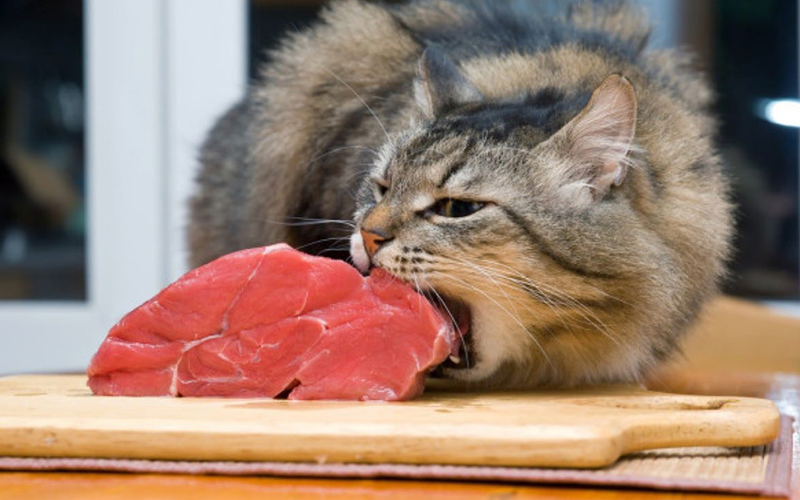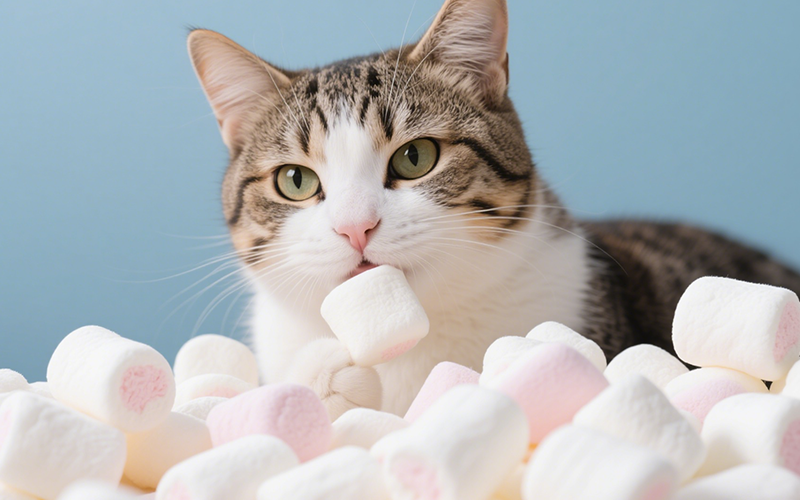Can Cats Eat Beef? A Guide to Feeding Beef to Your Feline Friend
- 27 Feb 2025 14:38
As a cat owner, you may have wondered whether beef is safe for your furry companion. While it’s true that cats are obligate carnivores, meaning they require a diet rich in animal protein, it’s important to consider whether beef is the right choice for your pet. In this article, we’ll discuss the benefits and potential risks of feeding beef to your cat, as well as guidelines for incorporating it into their diet.

The Nutritional Needs of Cats
Cats have specific dietary requirements that set them apart from humans and other animals. Being obligate carnivores, their bodies are designed to thrive on animal-based proteins, fats, and essential nutrients found in meat. Unlike omnivores, cats cannot synthesize certain vital nutrients, such as taurine, arachidonic acid, and vitamin A, from plant sources. Therefore, they rely on meat to meet their nutritional needs.
Is Beef Safe for Cats?
Yes, beef is generally safe for cats when fed in moderation and prepared properly. Beef is a good source of high-quality protein and essential nutrients like iron and zinc, which are beneficial for your cat’s overall health. However, there are some important considerations to keep in mind when feeding beef to your feline companion.
Benefits of Beef for Cats
High-Quality Protein: Beef is a great source of protein, which is essential for building and repairing tissues in your cat's body. Protein also helps support healthy muscle mass, immune function, and energy levels.
Rich in Iron: Beef contains heme iron, which is easily absorbed by the body and helps support your cat's red blood cell production. Iron is crucial for preventing anemia and maintaining overall health.
Vitamins and Minerals: Beef provides important vitamins and minerals, such as B-vitamins (including B12) and zinc, both of which play a role in energy production, skin health, and immune function.
Risks and Considerations When Feeding Beef to Cats
While beef can be a nutritious addition to your cat’s diet, there are a few risks and guidelines to consider:
Fat Content: Beef, especially certain cuts, can be high in fat. Feeding fatty beef to your cat in large amounts may contribute to obesity or digestive upset. It's important to feed lean cuts of beef and monitor portion sizes to avoid overfeeding.
Bones: Never feed your cat cooked bones, as they can splinter and pose a choking hazard or cause internal injuries. If you want to offer beef bones as a treat, make sure they are raw and large enough that they can't be swallowed whole.
Seasonings and Additives: When preparing beef for your cat, avoid adding seasoning, salt, or other additives. Many seasonings, such as garlic and onions, are toxic to cats and can cause severe health issues. Always serve beef plain and cooked thoroughly, without any additional flavorings.
Portion Control: While beef is a healthy protein source, it should be given as an occasional treat or supplement to your cat’s regular balanced diet. Too much beef can lead to an unbalanced diet, so it's important to offer it in moderation.
Risk of Food Allergies: Some cats may develop allergies to certain proteins, including beef. If you notice signs of an allergic reaction, such as vomiting, diarrhea, or itching, discontinue feeding beef and consult your vet for guidance.
How to Safely Prepare Beef for Cats
If you're interested in feeding beef to your cat, here are some tips for preparing it safely:
Cook the Beef: Always cook beef thoroughly to kill any harmful bacteria or parasites that could pose a risk to your cat's health. Avoid using any oil, butter, or seasonings, as these can upset your cat’s digestive system.
Serve in Small Portions: Offer beef as an occasional treat or supplement to your cat’s regular diet. Small, bite-sized pieces are ideal for serving, and they should not make up more than 10% of your cat's overall food intake.
Choose Lean Cuts: Select lean cuts of beef, such as sirloin or ground beef, to minimize the fat content. Fatty cuts like ribeye or T-bone should be avoided, as they can lead to digestive issues or weight gain.
Avoid Bones: As mentioned earlier, cooked bones should never be given to your cat. If you're offering beef with bones, make sure they are raw and large enough to prevent choking.
Signs of Beef Intolerance in Cats
Although beef is generally safe for most cats, some may have sensitivities or allergies. Watch for these signs if you're introducing beef to your cat's diet:
Vomiting
Diarrhea
Excessive scratching or itching
Swelling around the face or paws
Lethargy or loss of appetite
If any of these symptoms occur after feeding your cat beef, stop feeding it immediately and consult your veterinarian to rule out food allergies or intolerances.
What Should You Feed Your Cat?
While beef can be a healthy addition to your cat’s diet, it should never replace their primary food source. Cats require a balanced diet formulated specifically for their needs, which includes protein, fat, essential vitamins, and minerals. High-quality commercial cat food is designed to provide the correct nutrient profile to support your cat's health.
If you want to add variety to your cat’s diet, you can offer occasional meat-based treats, such as chicken, turkey, or even beef, but these should not replace their main food source. Always ensure that the treats are prepared safely and are free of harmful additives.
Conclusion: Can Cats Eat Beef?
In conclusion, cats can eat beef, but it should be done in moderation and with careful consideration of its nutritional value. Beef is a great source of protein, iron, and essential nutrients, but it's important to serve it in lean cuts, avoid bones, and refrain from adding seasoning. If you're ever in doubt about your cat’s diet or notice any signs of food allergies, consult with your vet for personalized advice.
For ongoing support in keeping your cat healthy, consider using PettureX, an AI-driven pet health assistant. PettureX provides 24/7 consultations on pet nutrition and health-related questions, ensuring that your pets receive the best care possible. Whether you have concerns about your cat’s diet or any other health issue, PettureX is there to guide you with expert advice and helpful insights.
Related

Marshmallows and Cats: A Puffy Problem? Why Vets Say No to This Sugary Snack
- 22 Apr 2025
Kefir for Kitties? A Veterinarian-Reviewed Guide to Safety, Benefits & Risks
- 22 Apr 2025
The Burning Question: Can Cats Eat Jalapenos? A Comprehensive Safety Guide
- 21 Apr 2025
Cool Temptation: Can Cats Eat Ice Cream Safely? The Vet-Backed Truth
- 21 Apr 2025
Frankly Dangerous: Can Cats Eat Hot Dogs? Vet Explains the Serious Risks
- 16 Apr 2025
A Purrfect Protein? Can Cats Eat Ground Turkey Safely? (Vet-Reviewed Guide)
- 16 Apr 2025
Gritty Situation: Can Cats Eat Grits Safely? Vet Explains the Risks
- 16 Apr 2025
Gravy Danger Zone: Can Cats Eat Gravy Safely? (Vet-Reviewed Warning)
- 16 Apr 2025
Crunchy Query: Can Cats Eat Green Peppers? A Vet-Reviewed Safety Analysis
- 16 Apr 2025
Toxic Temptation: Can Cats Eat Grapefruit? Vet Explains the Dangers
- 16 Apr 2025
